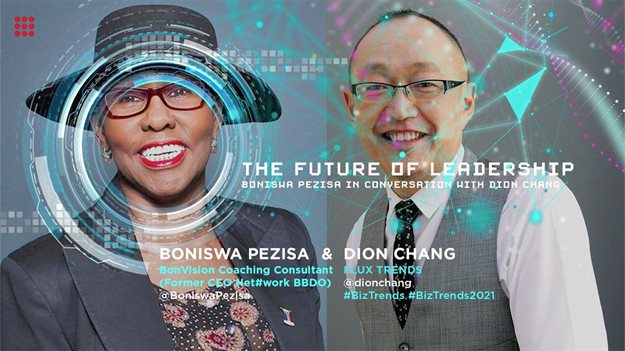Long gone are the days when the youth were relegated to be seen but not heard. We have now reached a point where the youngest generation currently joining the workforce - Gen Z - is not just seen and heard, but should be made a part of the decision-making process. This is according to Boniswa Pezisa, one of the speakers at the #BizTrends2021 live virtual event held last week, 28 January.
During this session, trend analyst and #BizTrends2021 emcee, Dion Chang chatted with Pezisa - BonVision coaching consultant and former CEO of Net#work BBDO - about the changing face of leadership, and what this young generation's entrance into the workplace means for the way business is run.
Change agents for the future
Depending on the source, the definition of Generation Z includes those born roughly between the mid-90s and 2010. They are described as 'digital natives' - having never known life without technology in the form of computers and mobile phones. The oldest of this cohort started entering the workplace as far back as eight years ago.
So what does this mean for business?
Pezisa believes it is essential for the sustainability of any organisation that Gen Z be included in the risk management or strategy team.
Touching on the three mega trends driving the world at the moment - environmental issues, social justice and the issues around tech and AR - Pezisa says that Gen Z is perfectly positioned to provide valuable input, with their understanding of technology - both the good and the bad. Organisations cannot expect to build businesses that will take us into the future without considering the legacy that Gen Z will inherit. Inclusion of this group is therefore key for sustainability - so that we can leave the Earth a better place for them.
"We tend to forget we run a business for a customer or for a consumer at the end of the day. That's why we need to bring them in. They are our consumers. They are the consumer of the future," Pezisa points out.
Consciousness in leadership
"Leadership of empathy, leadership of love is what this time requires and, I think, as we move forward, because the challenges of Covid could have been the challenges of climate or anything else," Pezisa says.
She encourages leaders to lead with intuition and connect with their tribe, to really understand what they're about. She asks what organisations are doing to reconnect with their tribes, to ensure their wellness is taken care of? "Mindfulness is a key prerequisite in an organisation from a leadership point of view."
Social justice
Chang's introduction to this topic includes reference to an insightful placard he'd seen at a protest outside a bank:
If climate was a bank you would have saved it long ago.
Pezisa believes that if organisations expect the general public to take responsibility and be accountable as economic challenges deepen, leaders need to include civil society as stakeholders, and ensure they are part of decision making.
"We have to lead beyond our authority," Pezisa states. "My authority is not just my little company - it is everything that surrounds me - that is around me."
In this way, leaders need to be aware that the decisions made at a business level can affect more that just the company - they can ripple out and impact groups that would never have otherwise been considered. Social justice is all about listening to and considering these other points of view.
The changing face of leadership
Following a challenging year, Pezisa points out that running a successful business is not solely a competition. Success does not breed in a vacuum, and should not be measured on a single business's bottom line, but rather the success of the ecosystem that makes up a business and its suppliers and stakeholders. In order to thrive, an organisation needs to ensure that those businesses that support and supply it are prospering too.
"Thrivers... have to be collaborators. Without collaboration, you cannot thrive. You have to collaborate with your teams, your staff, your customers, your suppliers, so you no longer run your organisation in a narrow way. You've got to have a broad perspective. Therefore inclusion is critical in every sense of the word."
Disruptive agility
Gen Z brings with it a new perspective - they ask questions that force leaders to think differently.
"To be truly agile, and be ready for any disruption, the management board has got to change," says Pezisa. Agility stems from diversity, which will ensure an organisation is ready to deal with whatever challenges it will face.
"When you embrace diversity in its truest nature, you are going to have different ideas that are going to prepare you for that," says Pezisa.
She believes that we need to slow down for a moment and review what constitutes the board, because only once new voices and different mindsets are included, can we really speed up to achieve success.
View this #BizTrends2021 session below:
























































